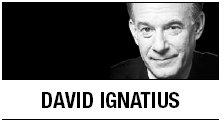WASHINGTON ― The art of modern politics involves creating the illusion of intimacy with our leaders. But two new biographies remind me that even the most famous personalities remain elusive and, in some ways, unknowable.

This combination of closeness and distance will be on display in the 2012 presidential election, where I’m guessing the candidates will be Barack Obama and Mitt Romney. These two politicians have worked overtime to seem relaxed and accessible; they make a point of wearing open-neck shirts and casual clothes, to appear like ordinary folks. Each has written a book that explains his life story in fastidious detail.
And yet, for all this seeming self-revelation, Obama and Romney remain two supremely mysterious people. I find that the more the packagers try to show the inner man, the less I understand what makes him tick. The politicians remain camouflaged, even as their surface features become ever more recognizable.
For a searching examination of the mysteries that are hiding in plain sight with our leaders, I commend two new works. They ultimately are about this paradox of public figures whose motivations remain, to the end, intensely private.
Take a look, first, at Chris Matthews’ thoughtful new book, “Jack Kennedy: Elusive Hero.” As a prominent television personality himself, Matthews understands the riddle of being constantly in the public eye, but also in another space the public doesn’t see. And he has brought this intuition to a re-examination of JFK, who you might think is the most chronicled and therefore the best understood president in modern history. Not so.
Drawing on interviews with people in Kennedy’s inner circle, Matthews paints a portrait of a man who was more wounded, physically and emotionally, than is generally understood. He was in much more physical pain than imaginable from the elegant figure we thought we knew. Matthews describes a 1954 back operation to repair vertebrae that were crumbling, perhaps in part because of JFK’s heavy use of steroids to treat his secret affliction of Addison’s disease. He quotes Kennedy adviser Ken O’Donnell: “The odds made by the political wise guys were that he wouldn’t live, and that if he did live he’d be a cripple.”
JFK, the American prince, was also a frail man psychologically. Raised by nannies and nurses, he had a deep fear of being alone, which was one reason he surrounded himself in later life with his personal retinue. That Irish political mafia is a special fascination for Matthews, who draws on his own experience as an Irish Catholic to explain what it’s like to be “in” but not “of” the Establishment.
The abiding insight in Matthews’ book is that it was the very traits JFK concealed that allowed him to resolve the Cuban missile crisis, his greatest test. His advisers were pushing toward war, but Kennedy escaped this conventional and potentially fatal analysis. “It was his detachment that saved us,” Matthews writes.
It may be a bit harder to find my second recommendation, which opened this weekend at theaters in four cities and will enjoy a wider release later this fall. It’s a new documentary film about former CIA director William Colby, made by his son Carl. It has the haunting title, “The Man Nobody Knew: In Search of My Father, CIA Spymaster William Colby.”
Colby was among the very best spies the CIA produced. Though his career was in the shadows, he shared some attributes with JFK: He was a Catholic, a war hero, and a man who led others partly by concealing his innermost feelings. Colby also exemplified what JFK never lived to see, which was how his “best and brightest” ran headlong into the shattering disaster of Vietnam.
The film converges on the true riddle of Colby’s life ― which is why this lifelong denizen of the secret world decided to go public with the agency’s “Family Jewels” in 1975, beginning an era of investigation from which the CIA has arguably never recovered. The son searches for his father’s motivation, through interviews with his family and friends: Was it a Catholic’s guilt over past misdeeds? Was it idealism? Was it a reluctance to say no to political pressure? Many people speculate in this film, but no one knows.
Colby died in a boating accident in 1996. He left a behind a mystery that even his son’s diligent and loving reconstruction cannot resolve. That’s so with most of our public personalities: The closer we get, the further they seem to recede.
By David Ignatius
David Ignatius’ email address is davidignatius@washpost.com. ― Ed.
(Washington Post Writers Group)




![[Herald Interview] 'Trump will use tariffs as first line of defense for American manufacturing'](http://res.heraldm.com/phpwas/restmb_idxmake.php?idx=644&simg=/content/image/2024/11/26/20241126050017_0.jpg)


![[Health and care] Getting cancer young: Why cancer isn’t just an older person’s battle](http://res.heraldm.com/phpwas/restmb_idxmake.php?idx=644&simg=/content/image/2024/11/26/20241126050043_0.jpg)
